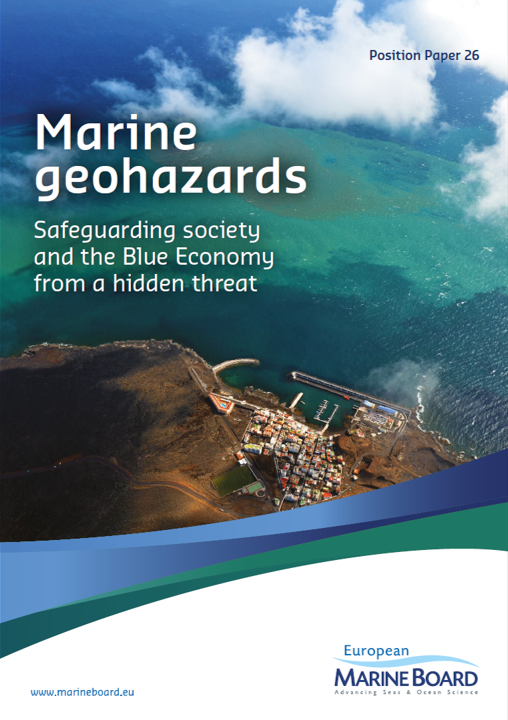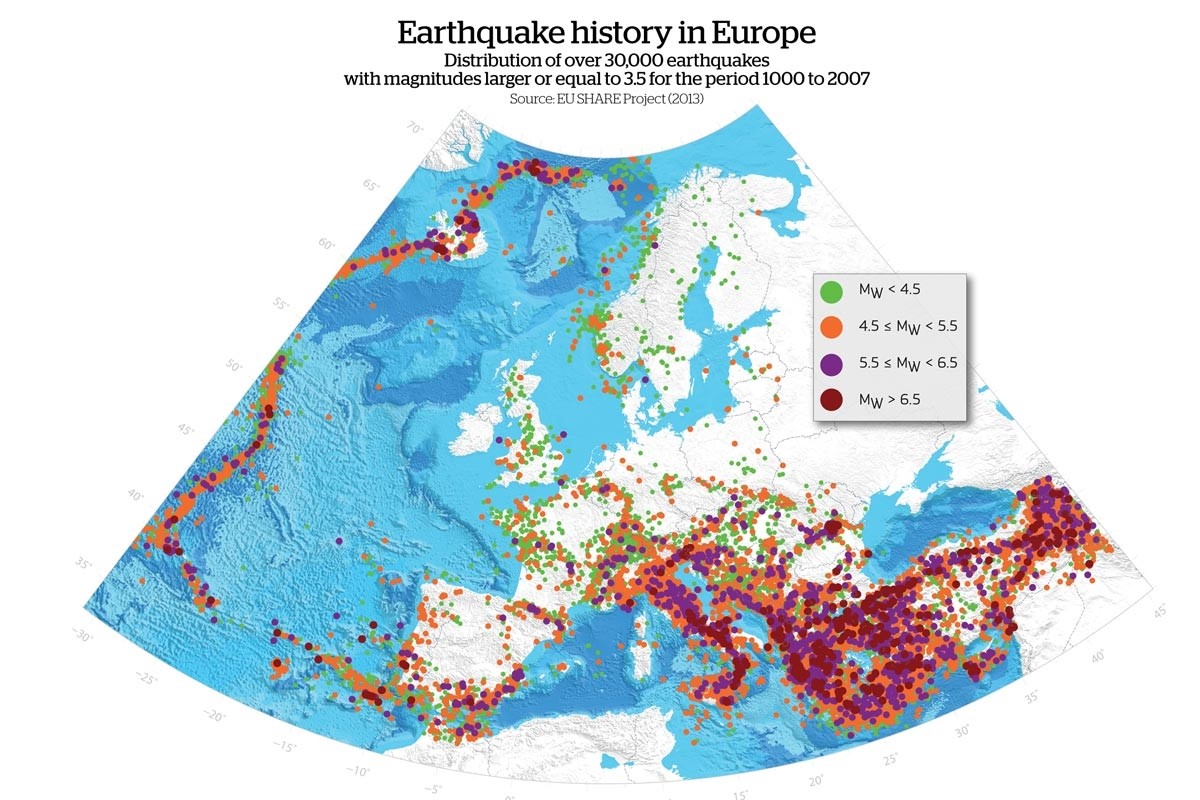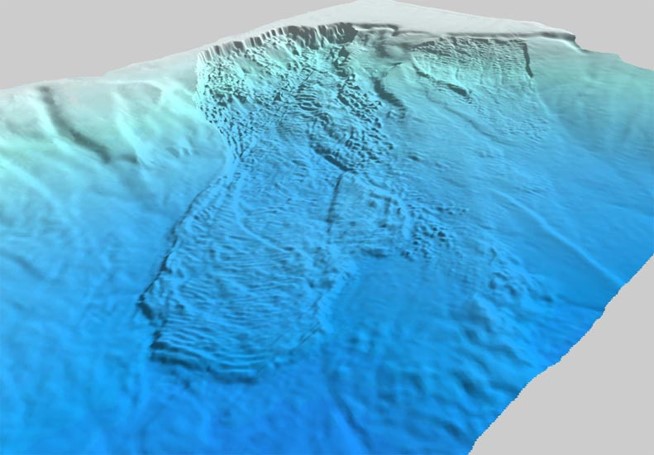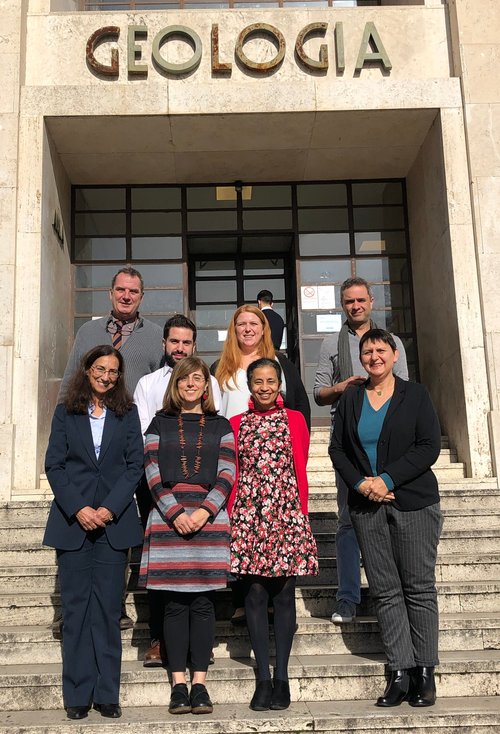Output
 Policy Brief 10, Uncovering the hidden threat of Marine Geohazards in Europe (April 2022)
Policy Brief 10, Uncovering the hidden threat of Marine Geohazards in Europe (April 2022)
Position Paper 26, Marine geohazards: Safeguarding society and the Blue Economy from a hidden threat (December 2021)
EMB Science Webinar on Marine Geohazards in Europe (December 2021)
Video "The best way to understand what is disaster risk" (January 2024)
Background
 The major marine geohazards are coastal erosion, seawater intrusion, earthquakes, submarine landslides, subsidence, tsunamis, natural gas hydrate dissociation, seabed sand waves, shallow gas, overpressure strata, gas chimneys, mud volcanoes and mud diapirism. The advancement of deep-water exploration activities, the uncertainties of the consequences of climate change, the latest catastrophic global events (e.g. the 2004 Indian Ocean and 2011 Japan tsunamis), and the increasing human population densities in the world’s coastal regions are responsible for the increased importance and awareness related to marine geohazard research. Specific threats to society from marine geohazards are the disappearance of valuable land near the shorelines, devastation of coastal areas by landslide-generated tsunamis and the destruction of seafloor installations (e.g. communication cables, pipelines).
The major marine geohazards are coastal erosion, seawater intrusion, earthquakes, submarine landslides, subsidence, tsunamis, natural gas hydrate dissociation, seabed sand waves, shallow gas, overpressure strata, gas chimneys, mud volcanoes and mud diapirism. The advancement of deep-water exploration activities, the uncertainties of the consequences of climate change, the latest catastrophic global events (e.g. the 2004 Indian Ocean and 2011 Japan tsunamis), and the increasing human population densities in the world’s coastal regions are responsible for the increased importance and awareness related to marine geohazard research. Specific threats to society from marine geohazards are the disappearance of valuable land near the shorelines, devastation of coastal areas by landslide-generated tsunamis and the destruction of seafloor installations (e.g. communication cables, pipelines).
Marine geohazards are slowly gaining political attention at European and international level. “A safe ocean” is one of the six societal objectives of the United Nations Decade of Ocean Science for Sustainable Development (2021-2030). In addition, “A Protective Europe” is one of the five future policy priorities for the European Union. The strategic planning of the Horizon Europe programme (2021-2017) also noted that impacts are expected from research and innovation activities to “improve disaster risk and societal resilience through better understanding of natural and man-made disasters and by the development of novel concepts and technologies to counter these risks”. In 2017 MEPs Gesine Meissner and Ricardo Serrão Santos hosted a “Gas Hydrates and Offshore Geohazards” event at the European Parliament, which concluded that offshore geohazards impede the development of Blue Economy and pose threats to ecosystem functioning. Marine geohazards may also hamper the effective implementation of policies such as the Maritime Spatial Planning (MSP) and Integrated Coastal Zone Management (ICZM), and in regions like the Mediterranean, marine geohazards can jeopardize economic activities and civil infrastructures.
It is essential to improve the knowledge and tools for identifying risks and set out a strategy for marine geohazard mitigation, in the context of other extreme events, such as meteotsunamis, as explained in European Marine Board’s Navigating the Future V.
This working group provides input to the UN Decade of Ocean Science for Sustainable Development (2021-2030) societal outcomes that aim for a sustainable and productive ocean and a safe ocean.
Objectives
Marine geohazards have not been on the policy landscape in the past, and the EMB proposes an expert working group to produce a Position Paper. The document should focus on marine geohazards, and include reference to coastal interactions. It should highlight the need for marine scientific research and further understanding of marine geohazards, how these impact the Blue Economy and how they may be influenced by climate change and the wider earth system. It should make specific recommendations, on what can be done to cope with this issue, for scientists, European and national policymakers, offshore industry representatives, research funders and centres, international and European efforts, and NGOs.
 Specific objectives include:
Specific objectives include:
- Define the state-of-the art in European research in this area;
- Draft the main R&D needs to increase understanding and European capability of this topic;
- Highlight scientific research and knowledge on marine geohazards, impacts on the Blue Economy, and connection with climate change and the wider earth system;
- Build interdisciplinary relationships between geology and other relevant fields of research (offshore structural engineering, benthic biology, climate change, etc.).
Credit image: Minisini et al. 2007
Terms of Reference
Marine geohazards have not been on the policy landscape in the past, and the EMB selected an expert working group to produce a Position Paper to make specific recommendations on what can be done to cope with this issue. The Terms of Reference produced for the operation and objectives of the Working Group can be consulted here (August 2019).
More information about how the EMB operate can be consulted in this page.
Meetings
- 10-11 February 2020, Rome, Italy - kick-off meeting (news)
- 9 March 2020, Online
- 17 April 2020, Online
- 19 May 2020, Online
- 3 June 2020, Online
- 15 July 2020, Online
- 2 September 2020, Online
- 1 October 2020, Online
- 26 October 2020, Online
- 14 December 2020, Online
- 18 January 2021, Online
- 26 January 2021, Online
- 8 February 2021, Online
- 18 February 2021, Online
- 9 March 2021, Online
- 18 May 2021, Online
- 10 June 2021, Online
Members
Chair: Heidrun Kopp, GEOMAR Helmholtz Centre for Ocean Research Kiel, Germany
Co-Chair: Francesco Chiocci, University of Rome "Sapienza", Italy
Working group members:
Christian Berndt, GEOMAR Helmholtz Centre for Ocean Research Kiel, Germany
Namık Çağatay, İstanbul Technical University, Turkey
Teresa Ferreira, University of the Azores, Portugal
Juana Fortes, LNEC - National Laboratory for Civil Engineering, Portugal
Eulàlia Gràcia, ICM-CSIC - Institute of Marine Sciences, CSIC, Spain
Achim Kopf, MARUM – Center for Marine Environmental Sciences, University of Bremen, Germany
Mathilde Sørensen, University of Bergen, Norway
Nabil Sultan, Ifremer, France
Isobel Yeo, NOC – National Oceanography Centre, UK
Additional contributions from Alba González Vega (EMB Young Ambassador Alumna)
Contact at European Marine Board Secretariat: Ángel Muñiz Piniella Email